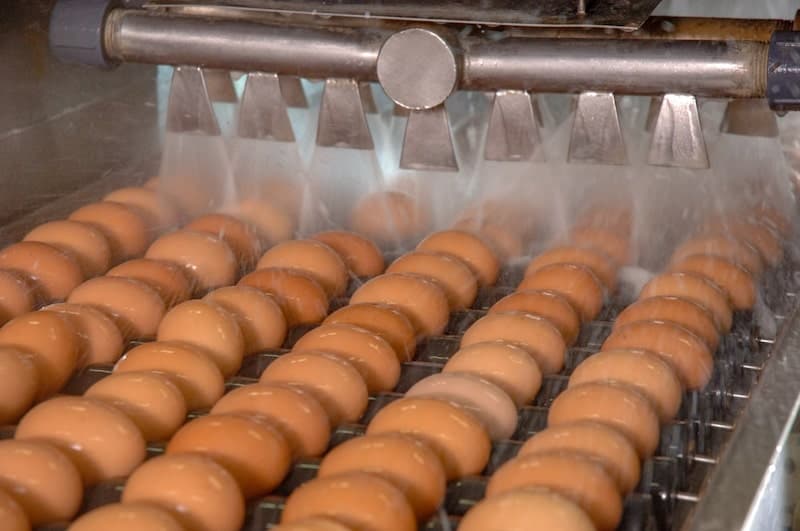How Are Eggs Cleaned Commercially? (Explained!)
One of the most significant differences people notice when shopping for groceries in the United States versus Europe is that in the US, eggs are cleaned commercially and kept refrigerated, while in Europe, eggs are kept at room temperature without regulations for cleaning.
Both measures are designed to prevent salmonella, but the strategies are different. The USDA requires that all companies with 3,000 or more egg-producing hens clean the eggs before distributing them to consumers.
So, how are eggs cleaned commercially? It’s a whole process of misting them with water, spraying them with soap or detergent, brushing them gently with brushes, spraying them with an antimicrobial rinse, and then blowing them dry with air jets.
The egg wash process is commercially regulated by the USDA, the FDA, and the EPA to ensure that eggs have a reduced risk of transmitting salmonella while protecting consumers and the environment from harsh cleaning products.
Read on to learn more.

Do Eggs Need to be Cleaned for Commercial Sale?
In the US, eggs must be cleaned before commercial sale. All egg producers with more than 3,000 egg-laying hens must clean their eggs before distributing or selling them.
Smaller egg-producing companies, like backyard farms or neighborhood co-ops, are not subject to the same regulations and may not clean their eggs before selling them.
How Are Eggs Washed Commercially?
Eggs are washed or cleaned for consumers in one of two ways:
Washing
Most eggs sold in the United States are washed in a multi-step process that includes:
- Wetting the eggs with a light spray of warm water
- Spraying the eggs with soap or detergent
- Rotating the soapy eggs through a brush system to remove dirt and debris
- Spraying the eggs with an antimicrobial sanitizing rinse
- Drying the eggs with air jets
Pasteurization
Eggs may be gently heated to temperatures high enough to kill bacteria but low enough to not begin cooking the egg.
Pasteurization is sometimes performed on whole eggs with the shell but is most common in unshelled liquid egg products.
Washing eggs commercially is a complex, detailed process that must be done delicately and with precise specifications.
Eggs should not be exposed to cold water, nor should they be exposed to too hot water. Detergents and cleaning agents should be gentle but effective.
Most professional egg companies use machines that automatically wash eggs during the sorting process so that eggs are cleaned and sorted simultaneously.
Why Don’t Europeans Wash Eggs?
Eggs are naturally protected by a thin exterior barrier known as a “cuticle” or “bloom.”
This barrier protects the egg from bacteria and contamination, seals the egg, and preserves moisture. When eggs are washed, this barrier is removed.
Therefore, eggs that have been commercially washed must be refrigerated immediately and stored at cool temperatures until they are eaten.
Consumers don’t need to re-wash the eggs at home.
In Europe, eggs are not washed to preserve the natural anti-bacterial cuticle.
Unwashed eggs can be safely stored and sold at room temperature, but consumers must wash the eggs at home before using them.
When buying eggs in the US from a farmer’s market or small egg producer, the eggs are often unwashed, stored, and sold at room temperature.
You can keep the eggs at room temperature and wash them just before using them, or wash them when you get them home and store them in the refrigerator.
Remember that washed eggs must be either refrigerated or cooked immediately to reduce the risk of salmonella.
Are Commercial Eggs Bleached?
Commercial eggs are not bleached to make the shells white.
White egg shells are created naturally by white chickens, while brown eggs come from brown chickens. And due to natural, external factors, some brown eggs can turn white.
However, most commercially produced eggs in the US are treated with a final, antimicrobial, anti-bacterial rinse high in chlorine.
The chlorine is used to sterilize the egg and kill surface bacteria and does not change the color of the shell.
Chlorine evaporates quickly and does not remain on the eggs, and the chlorine rinse used in commercial egg washing does not affect the color, flavor, or nutrition of eggs.
During the cleaning process, eggs are not bleached or immersed in bleach or chlorine.
In Summary
Commercial egg production in the US is a big business, and there is a vast range of professional egg cleaning and sorting machines that gently clean eggs to USDA standards.
Because the process is complex and delicate, it is often good to automate egg washing rather than cleaning eggs by hand.
Washing eggs removes dirt and debris while also removing bacteria and reducing the risk of salmonella and other food-borne illnesses.
Remember that eggs produced in the US are not bleached to make the shells white: white eggshells are the natural color laid by white chickens.
All eggs sold commercially in the US by large companies are washed and cleaned before being sold to consumers, and washed eggs must be refrigerated.
However, small farms and hobbyists are not required to wash eggs before selling them, so their eggs may be stored at room temperature.
Either way, it’s vital to ensure that eggs are washed before you cook with them to protect you and your family from bacteria and food-related illnesses.






